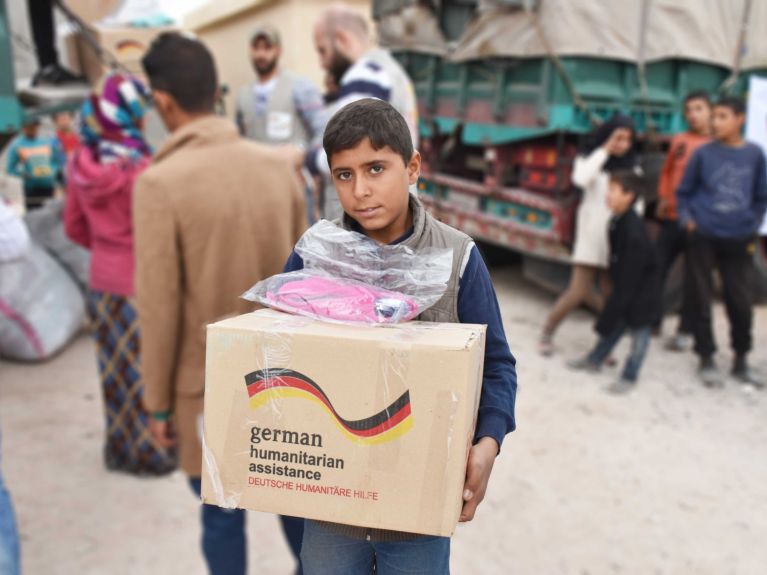“People are the central focus”
Germany has been providing humanitarian assistance worldwide for more than 50 years. Learn about the concrete help that is made available to people in crisis areas.

Bangladesh, Ukraine, Democratic Republic of the Congo: As director of humanitarian assistance at Germany’s Federal Foreign Office, Susanne Fries-Gaier experiences humanitarian disasters at first hand. She explains what Germany does to help and which challenges face humanitarian assistance.

Dieses YouTube-Video kann in einem neuen Tab abgespielt werden
YouTube öffnenThird party content
We use YouTube to embed content that may collect data about your activity. Please review the details and accept the service to see this content.
Open consent formMs Fries-Gaier, Germany provides humanitarian assistance in numerous countries. How has its commitment evolved in recent times?
The UN estimates that around 340 million people are now reliant on humanitarian assistance, more than ever before. There are several reasons for this: for one thing, crises are lasting longer and longer. What is more, many countries are still battling with the after-effects of the pandemic, and climate changeis making entire regions uninhabitable. Then there is Russia’s war of aggression against Ukraine.
Germany has therefore stepped up its humanitarian assistance. We made 3.2 billion euros available in 2022, as compared with just 500 million euros in 2015. This makes Germany the second-biggest donor after the USA. We provide financial support for humanitarian organisations and, via our partners such as the Federal Agency for Technical Relief, respond immediately to natural disasters such as the flooding in Pakistan or the earthquakes in Turkey and Syria. However, it is just as important to tackle the causes of conflicts. In addition, we try to be as forward-looking as possible; not only is this more dignified, it also saves costs in the long term.
What is meant by forward-looking humanitarian assistance?
Forward-looking humanitarian assistance is based on the idea of helping people before a crisis actually occurs. Take the 2020/2021 locust plague in the Horn of Africa for example: 230 million US dollars was spent on tackling the plague. That might sound at first like a great deal of money, but it prevented damage that would have cost 1.7 billion US dollars. Germany has committed to spending five per cent of its total humanitarian assistance budget on forward-looking measures to combat humanitarian disasters, and is also encouraging other donor states to follow suit because we are convinced that this is the right thing to do.
What challenges does climate change pose for humanitarian assistance?
Climate change particularly affects the poorest of the poor. In the Horn of Africa for example, the rainy season has failed five times in a row. As a result, entire regions are becoming uninhabitable.
Humanitarian assistance must therefore be even better coordinated with development cooperation and measures to promote peace. For the Horn of Africa, this means that humanitarian assistance is provided to soften the impact of crop failures, and that people are supported at the same time by development cooperation so that they can continue using their fields even under the changed conditions. Furthermore, new conflictscaused by climate change, such as disputes over the distribution of water and land, need to be prevented.
Humanitarian assistance has been a central element of German foreign policy for more than 50 years. What has changed during this time?
Unfortunately, humanitarian assistance has become increasingly important, but also increasingly difficult. The original idea was to provide short-term help in emergencies, with development policy actors then supposed to take over. The latter need a functioning government at the local level, however. And that can no longer be taken for granted in many contexts. Consequently, inSyria or Afghanistan, humanitarian actors are often the only aid organisations on the ground.
On the other hand, humanitarian assistance has become much more professional in recent years. Since 2016, actors work together to make the system even more effective and gender-sensitive. Nowadays, humanitarian assistance takes much more care to place the emphasis on the people concerned and their needs. Local organisations are supposed not only to implement measures, but also to decide themselves where the aid should go.
What motivates you to engage in humanitarian assistance?
What motivates me is presumably the same thing that motivates anyone who engages in humanitarian assistance: We know that what we are doing will save lives and ease suffering During my travels, I have seen what concrete help people receive as a result of our humanitarian activities. I am very proud of the fact that Germany is so broadly committed to humanitarian assistance.
What Germany does to help – find out more here.
Dieses YouTube-Video kann in einem neuen Tab abgespielt werden
YouTube öffnenThird party content
We use YouTube to embed content that may collect data about your activity. Please review the details and accept the service to see this content.
Open consent form



